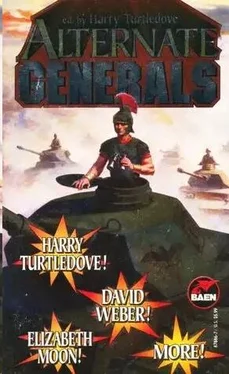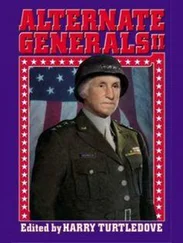Harry Turtledove - Alternate Generals
Здесь есть возможность читать онлайн «Harry Turtledove - Alternate Generals» весь текст электронной книги совершенно бесплатно (целиком полную версию без сокращений). В некоторых случаях можно слушать аудио, скачать через торрент в формате fb2 и присутствует краткое содержание. Год выпуска: 2000, ISBN: 2000, Издательство: Baen, Жанр: Альтернативная история, на английском языке. Описание произведения, (предисловие) а так же отзывы посетителей доступны на портале библиотеки ЛибКат.
- Название:Alternate Generals
- Автор:
- Издательство:Baen
- Жанр:
- Год:2000
- ISBN:0-671-87886-7
- Рейтинг книги:3 / 5. Голосов: 1
-
Избранное:Добавить в избранное
- Отзывы:
-
Ваша оценка:
- 60
- 1
- 2
- 3
- 4
- 5
Alternate Generals: краткое содержание, описание и аннотация
Предлагаем к чтению аннотацию, описание, краткое содержание или предисловие (зависит от того, что написал сам автор книги «Alternate Generals»). Если вы не нашли необходимую информацию о книге — напишите в комментариях, мы постараемся отыскать её.
Alternate Generals — читать онлайн бесплатно полную книгу (весь текст) целиком
Ниже представлен текст книги, разбитый по страницам. Система сохранения места последней прочитанной страницы, позволяет с удобством читать онлайн бесплатно книгу «Alternate Generals», без необходимости каждый раз заново искать на чём Вы остановились. Поставьте закладку, и сможете в любой момент перейти на страницу, на которой закончили чтение.
Интервал:
Закладка:
Alternate Generals
ed. by Harry Turtledove and Roland Green
The Test of Gold
Lillian Stewart Carl
The old man lowered himself carefully onto the couch.
Every day the pain in his belly grew worse. By winter he’d be at rest in the tomb of his ancestors beside the Appian Way. He’d had a long life, as soldier and merchant, and if Mars, Mercury, and Mithras called him, so be it.
But there was something he had to finish first.
Through the opening of the atrium he could just see Caligula’s old bridge between the Palatine and the Capitoline, a hard marble angle against the glare of the summer sky. A beam of sunlight touched the door of the room. The air was warm and still. Even so he felt cool, as though the rectangular porphyry panels and columns of his home exuded a chill.
Unless it was simply the memory of chill. He leaned closer to his table, spread out the scroll, and started to read what he’d already written.
Ave. I was named C. Marcus Valerius after my father and tutored by the best Greek slaves. At the age of twenty, in the sixth year of the reign of Nero Augustus, I was made a military tribune and assigned to the staff of Catus Decianus, procurator of the province of Britannia. My mother and sisters wept to see me off to the very edge of the earth, but my father reminded me I was now beginning a brilliant career.
The road through Gaul was long. The farther north I went the colder the wind grew and the more sullen the rain. But the coarse humor of my little band of legionaries never faltered. One auxiliary from Iberia, called Ebro after his native river, jested even with me. At first I took offense. Then I realized that Ebro had many campaigns beneath his corselet, while I had none, and I learned to return gibe for gibe.
By the time we took ship across a rough gray sea and landed in Britannia I was wet through, unshaven, muddied from boot to helmet. And yet I could do no less than to press on, doing my duty, with that Roman honor which brought us not only an empire but the will to rule it.
In Londinium I presented myself to Catus Decianus.
He had the small sleek head and obsidian eyes of a snake, and barely gave me time to bathe before he assigned me a task.
“The king of one of the British tribes,” he explained, “has lately died. He bequeathed half his property to the Emperor. As well he should, after all the trouble he caused us ten years ago. These barbarians are a stubborn lot. All we intended was to disarm them, and they had the gall to rebel.”
I nodded as sagely as I could.
“The kings name was Prasutagus,” Catus went on.
“Of the Iceni, beyond Camulodunum. He has no male heir, so there’s no question of the kingdom continuing. You’re to make an accounting of the Emperor’s property. I intend to deliver it to the governor when he returns from his campaign against the Druids.”
Thanks to Ebro’s stories I knew what he was talking about.
“The Druids are the priestly class. They have great power, no Gaulish or British ruler will make a move without consulting with one.”
If Catus was impressed with my knowledge, he showed no sign of it.
“So it’s in our best interests to stamp them out. Suetonius has them bottled up on some island in the northwest, and their women with them.”
“I’d like to pay my respects to Gaius Suetonius Paulinus. And my father’s. They campaigned together in Mauretania.”
Then you’d better get on with it. Tribune. Suetonius will be back before summer, his eagles draped with Druid gold. You don’t want to still be mucking about in a barbarian village by then, do you?”
“No sir.” I saluted.
“Until I return, then, sir.”
Catus was already unrolling a scroll, and dismissed me with a wave of his hand. I reminded myself I needed his good will to advance my career and set out on the next stage of my journey.
Londinium was little more than a cluster of merchant’s wood and wattle houses around a bridge over the Tamesis, although I could tell from the new roads being driven outward in every direction that Suetonius intended the city to be a hub of commerce. The road north cut through marshland.
When I think of Britannia I think of water—the great river, the marshes, heavy clouds like sopping fleeces, unrelenting rain. There trees grow thick and forests thicker. But just as I decided Britannia was the soggy frontier of Hades itself, the rain ended and a warm wind rolled up the clouds. For the first time I saw the British spring, so many shades of green I couldn’t count them and a sky of such rich blue as to put lapis lazuli to shame.
Camulodunum, an old tribal capital, had been made into a colonia for retired legionaries. This part of the country was pacified, and all the building work had gone into a vast temple to Roma and Claudius Augustus. Just completed, it stood square and proud—and, I had to admit, pretentious—among the mounds of the native huts. The natives themselves cleared away leftover stones, casting resentful glances toward the old soldiers who lounged on the steps.
Ebro spat onto the paving stones. He could say more with a glob of spit than most men with words. But, as befitted my dignity, I didn’t ask whether he was reproving the native workers or our own veterans.
At last Venta Icenorum rose before us. Black birds swooped and croaked above huge circular earthworks.
Human skulls grinned from recesses in the gate posts.
The guards were tall blond men sporting fierce moustaches, hair swept back like horses’ manes, and massive embossed shields. They greeted me civilly enough in their strange tongue, although there was a certain amount of sword and spear rattling as they conducted me through the town. By standing as straight as I could I made myself as tall as the shortest of them.
Women and children dropped their tasks and looked at me. Even the dark eyes of the cows and horses turned my way. My escort strolled along casually, but one sharp look from Ebro and my legionaries marched in good order.
The buildings were also circular, of wood pilings with conical thatched roofs. Inside the largest was a vast hall ringed with wooden pillars. A ray of sunlight struck through a vent hole in the roof. In the dimness beyond stood several more warriors. The king’s guard, I assumed, now at loose ends.
But the warriors seemed more haughty than uncertain.
Turning, they deferred to a figure who stepped through a curtained doorway. A woman. I waited a moment, but no one else appeared.
She was tall as the men, a full handsbreadth taller than me. She wore a dress and a cloak woven in squares of different colors. Holding the cloak was a gold brooch cunningly wrought in swirls of gold, decorated with enamel chips. About her neck lay a gold tore, strands of braided wire with animal-headed knobs resting against her white throat. Even her hair was gold, a startling golden red, braided and ornamented with beads. Her eyes were as blue as the British sky. They fixed on my face, looking me up and down in the same manner I’d inspect a horse, although I’ve never been quite so amused by an animal.
Everyone was looking at me. They expected me to deal with a woman. I made a show of removing my helmet and tucking it under my arm.
“Ave. I am C. Marcus Valerius. I bring greetings from the Senate and the people of Roma.”
“I am Boudica, queen of the Iceni. My husband was your ally.”
Ally, not client, I noted. But I’d heard that these Britons were a proud people.
“I’m tribune to Catus Decianus, procurator. I’ve come to make an accounting of your husband’s legacy.”
“I’ve never known a Roman,” she said, “who’d let anything of value slip through his fingers.”
Читать дальшеИнтервал:
Закладка:
Похожие книги на «Alternate Generals»
Представляем Вашему вниманию похожие книги на «Alternate Generals» списком для выбора. Мы отобрали схожую по названию и смыслу литературу в надежде предоставить читателям больше вариантов отыскать новые, интересные, ещё непрочитанные произведения.
Обсуждение, отзывы о книге «Alternate Generals» и просто собственные мнения читателей. Оставьте ваши комментарии, напишите, что Вы думаете о произведении, его смысле или главных героях. Укажите что конкретно понравилось, а что нет, и почему Вы так считаете.












